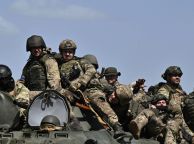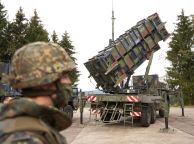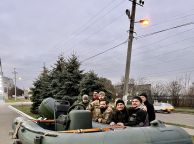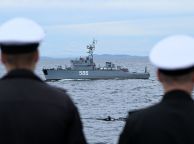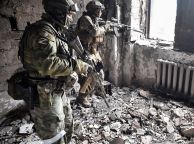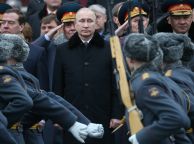By David Brennan
The Lebanese Hezbollah militia is reportedly in possession of Russian-made anti-ship missiles, after the group's leader Hassan Nasrallah threatened "something in store for the U.S. vessels" operating in the Middle East region.
Reuters reported on Wednesday—citing two anonymous Lebanese sources—that the Iranian-aligned militia group has added the P-800 Oniks, which in its export form is known as the Yakhont, to its formidable missile arsenal.
"There's the Yakhont, and of course there are other things besides it," one unnamed Lebanese source told Reuters. Another added: "We're obviously paying a lot of attention to that...and we're taking what capabilities they have seriously."
Kremlin spokesperson Dmitry Peskov said the Reuters report "is news without any confirmation at all. We do not know if it is true or not." He added: "We do not have such information." Russia has previously sold the Yakhont to Syria, which has been known to supply Hezbollah with a range of weaponry.
Hezbollah has never admitted possession of the Yakhont, with Nasrallah and his senior officials closely guarding any detailed information about the group's missile arsenal. Hezbollah's capabilities are believed to have vastly expanded since its 2006 war against Israel. Newsweek has contacted a Hezbollah spokesperson via WhatsApp to request comment.
The Yakhont has a range of around 186 miles and can carry either a 440-pound high explosive or 550-pound semi-armor piercing warhead. Nearly 30 feet long, the missile flies at speeds of up to around 1,900 miles per hour, making it supersonic.
The weapon has been used by Russian forces during Moscow's intervention in the Syrian civil war, and in its full-scale invasion of Ukraine.
Last month, Lebanese political analyst Nasser Qandil—considered to be close to Hezbollah—said on his YouTube channel that the Yakhont is "the most important prize" from the group's involvement in Syria, where it proved influential in propping up President Bashar al-Assad's beleaguered dictatorship alongside Russia and Iran.
"Hezbollah is prepared and ready," Qandil said, as quoted by Reuters, and noting that the Yakhont can be used against American ships operating in the area. The U.S. has deployed two aircraft carrier groups and a nuclear-powered cruise missile submarine to the Middle East region in recent weeks, amid Israel's showdown with Hamas in the Gaza Strip and ongoing skirmishes with Hezbollah.
The Center for Strategic and International Studies' Missile Threat database reported that the U.S. has suggested Hezbollah acquired 12 Yakhont systems from Syria at some time before January 2016. However, it added that Hezbollah is not believed to be able to fire the missiles without Iranian and/or Syrian support.
"Israel considers the Yakhont one of the main threats it faces from Hezbollah, as the missile threatens shipping along Israel's entire coastline and could complicate any potential blockade of Lebanon," the Missile Threat site said.
Newsweek has contacted the Israel Defense Forces and the Pentagon by email to request comment.

